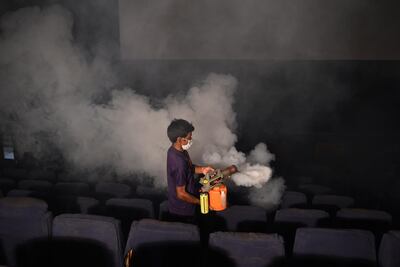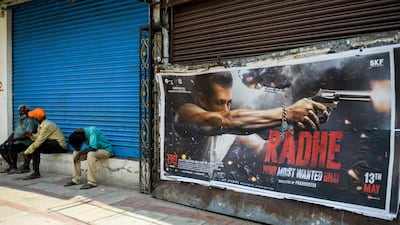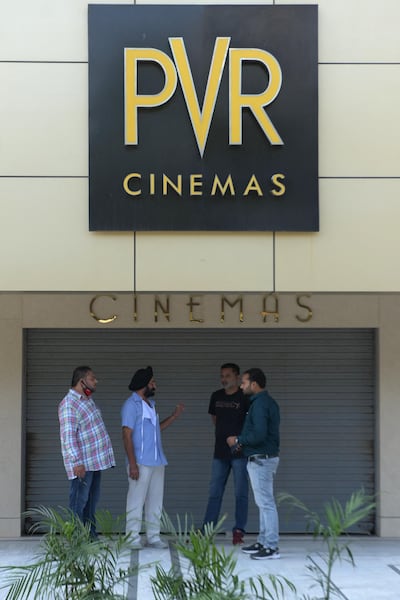Hollywood seems on the road to recovery with cinema schedules slowly filling up with blockbusters for the first time in more than a year since the pandemic began. However, for Bollywood, another of the world's largest film industries, things currently appear worse than at the height of the first wave of the coronavirus pandemic last year.
The Indian film industry based out of Mumbai dwarfs Hollywood in terms of output. In 2019, the year before Covid-19 played havoc with shooting schedules globally, the Film Federation of India reported that 2,446 Indian films were certified by the country's Central Board of Film Certification. That is more than three times the 700 or so movies Hollywood produces in a typical year.
Fast-forward to the present and business consultancy Ernst & Young said in its recent annual Indian media and entertainment industry report that the film sector's value crashed by more than half – from $2.6 billion in 2019 to $1bn in 2020. And, as the country struggles with a second wave of Covid-19 infections, and with cinemas closed and production no longer taking place, there seems limited scope for optimism this year, too.
Mumbai's film industry produces almost half of India's movies, and was put on hiatus by the local government in mid-April amid rising infection rates. This meant big-name productions such as Ram Setu, Amazon Prime Video's first Indian co-production starring Akshay Kumar; and Goodbye, starring Amitabh Bachchan, ground to a halt. Ram Setu had already suffered delays at the beginning of April when Kumar and 45 other crew members tested positive for Covid-19. Similarly, the theatrical Eid release of Salman Khan's Radhe: Your Most Wanted Bhai was cancelled, and the film launching only on streaming platforms in India instead.

Other state governments have followed suit with restrictions to stem the rise in Covid-19 infections. Coupled with self-imposed regulations adopted by India's numerous regional industries, it's almost impossible to gain a clear national picture since state Covid-19 measures are not led by the central government. Zakir Hussain, whose Icon Art Production in Dubai provides crew and equipment to many Indian films made in the city, says the entire industry is in de facto lockdown until at least this month. Cinemas nationwide are also closed again after reopening last October and operating at 100 per cent capacity in February.
The immediate future for the industry seems uncertain at best – which is perhaps why few of the major studios and distributors of Indian films in India and the Gulf contacted by The National were prepared to comment on their plans or expectations for the short to medium term.
One tactic employed by productions in the West to continue amid the pandemic has been to set up "bubbles" in foreign locations where regulations allow for it. Tom Cruise and the Mission: Impossible team, for example, set up Covid-secure sets in the UK and Abu Dhabi in order to keep filming. But with travellers from India currently barred from entering many countries around the world, including the UAE, owing to the more contagious variant that has emerged there, this option is off the table.
Abu Dhabi's twofour54, which has provided location services for many Indian productions in recent years, says it is in constant discussions with producers and there is "a lot of interest" in shooting in the capital once regulations allow, but offers no indication of when this could be.
While the major studios we contacted did not comment on the specifics of shutdowns or potential restarts, they were keen to point out that they are not sitting idle waiting for the pandemic to pass. Aditya Chopra, filmmaker and chairman of Yash Raj Films (producer of 2019's biggest Indian box office success War), committed to buying vaccines for industry workers in an attempt to get productions back on track.
"Aditya Chopra has come forward to vaccinate the daily workers of the entire Hindi film industry," Yash Raj Films told The National in a statement. "YRF has urged Maharashtra chief minister Uddhav Thackeray to allow the company to purchase 60,000 Covid-19 vaccines and take care of all the expenses related to the immunisation programme for these workers."
Shorts TV, a global streaming platform that hosts Oscar-qualifying short film releases from around the world, runs the Best of India Short Film Festival each year. Chintan Sarda, vice president for Indian content acquisition at Shorts TV, reveals that this year the festival attracted more entries than ever.
"It's a pretty democratised filmmaking process since 4K cameras are available on your phone, then you can just finish it off on software," he says. "It's no longer a necessity to have a crew of 15 or 20 people to make a film. I guess when people have time on hand, they have time to read up and learn the craft, and just produce."
Sarda says, however, that DIY lockdown films are unlikely to bridge the $1.6bn hole left in the industry last year. "What really gets audiences is still celebrities in India ... stars they've grown up watching. What we are seeing this year is very few celebrities because they played safe and they're not shooting."
For now, it seems the big studios simply do not know when to expect some sort of normality to return. From the relative safety of his UAE home, Hussain seems optimistic that the wait may not be too long. "Have patience and keep moving forward," he says.
For Sarda in India, however, matters are more complicated: "There is little clarity on how things will unfold because they're expecting a third wave. Most big [studios] have abandoned projects or put them in cold storage. There's no point keeping people on the payroll with no idea when you're going to shoot. A few months ago, there was some excitement about things opening up [but] things got so bad so quickly ... I guess they want to play safe."


